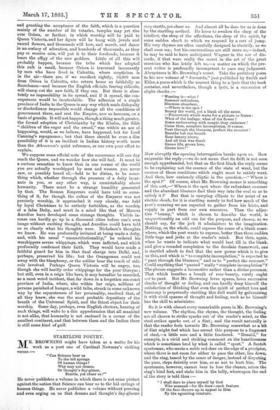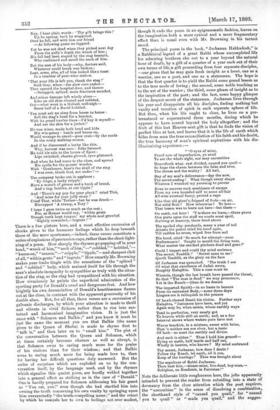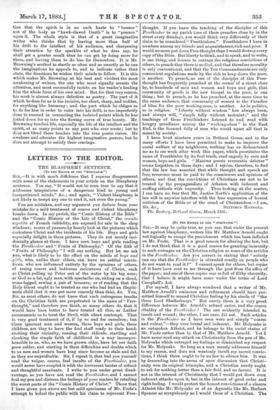STARTLING POETRY.
R. BROWNING might have taken as a motto for his work as a poet one of Cardinal Newman's striking verses :—
"Can Science bear us
To the hid springs
Of human things P
Why may not dream, Or thought's day-gleam, Startle, yet cheer us ?”
He never publishes a volume in which there is not some protest against the notion that Science can bear us to the hid springs of human things. He never publishes a volume without pressing and even urging on us that dreams and thought's day-gleams may startle, yet cheer us. And almost all he does for us is done by the startling method. He loves to awaken the sleep of the intellect, the sleep of the affections, the sleep of the spirit, by some sudden shock to which we respond by a sort of jump.
His very rhymes are often carefully designed to electrify, as we shall soon see; but his constructions are still more so,—indeed, he may be said to have anticipated Wagner in the use of dis- cords, if that were really the secret in the art of the great musician who has lately left us,—a matter on which the pre- sent writer is profoundly incompetent to pass any judgment.
Abruptness is Mr. Brovvning's secret. Take the prefatory poem to his new volume of " Jocoseria," just published by Smith and Elder, a poem which is the nearest thing to a lyric that the book contains, and nevertheless, though a lyric, is a succession of slight shocks :—
"Wanting is—what ?
Summer redundant., Blueness abundant, —Where is the spot ?
Beamy the world, yet a blank all the same, —Framework which waits for a picture to frame : What of the leafage, what of the dower?
Roses embowering with nought they embower !
Come then, complete incompletion' 0 comer,
Pant through the blueness, perfect the summer !
Breathe bat one breath Rose beauty above, And all that was death Grows life, grows love, Grows love!"
How abruptly the opening interrogation breaks upon us. How enigmatic the reply ;—we do not mean that its drift is not soon enough apprehended, but that on the first blush the reply seems
to be explaining not the essence of the state of want, but the essence of those conditions which ought most to satisfy want. And then, how curiously elliptic is the question,—" Where is the spot ?" Of course, what Mr. Browning means is something of this sort,—` Where is the spot where the redundant summer
and the abundant blueness find their way into the soul so as to satisfy it?' But that is carrying ellipsis to the point of an electric shock, for it is startling merely to feel how much of the poet's meaning we are expected to gather from his hints, and supply in part from our own resources. Then the adjec- tive " beamy," which is chosen to describe the world, is unquestionably an odd one for the purpose, and chosen, as we should say, for the jerk it administers to the imagination.
Nothing, on the whole, could express the sense of a blank some- where, which the poet wants to express, better than these sudden little tugs and jerks at the reader's mind. But then, again, when he wants to indicate what would best fill in the blank, and give a rounded completion to the desolate framework, one is startled afresh to find that the new power which is to give us this, and which is "to complete incompletion," is expected to "pant through the blueness," and so to "perfect the summer." Could anything that "panted" really "complete incompletion"?
The phrase suggests a locomotive rather than a divine presence. That which breathes a breath of rose-beauty, surely ought not to pant. But Mr. Browning loves spasm, loves successive shocks of thought or feeling, and can hardly deny himself the satisfaction of thinking that even the spirit of perfect love and harmony is perpetually startling this dull world by galvanising it with vivid spasms of thought and feeling, such as he himself has the skill to administer.
So it is with almost every remarkable poem in Mr. Browning's new volume. The rhythm, the rhyme, the thought, the feeling are all chosen to strike sparks out of the reader's mind, as the steel strikes sparks out of a flint; and the result naturally is that the reader feels towards Mr. Browning somewhat as a bit of flint might feel which has served this purpose to a fragment of steel,—a little sore and a little fractured. "Donald," for example, is a vivid and striking comment on the heartlessness
which is sometimes bred by what is called "sport." A &doh sportsman, who meets a noble red-deer on the edge of a precipice, where there is not room for either to pass the other, lies downs and the stag, tamed by the sense of danger, instead of disputing the pass, steps daintily over him, so as not to hurt him. The sportsman, however, cannot bear to lose the chance, seizes the
stag's hind feet, and stabs him in the belly, whereupon the end of the story is told thus :-
"I shall dare to place myself by God
Who scanned—for He does—each feature Of the face thrown up in appeal to Him By the agonising creature.
I hear plain words : Thy gift brings this !'
Up he sprang, back he staggered, Over he fell, and with him our friend —At following game no laggard.
Yet he was not dead when they picked next day From the gully's depth the wreck of him ; His fall had been stayed by the stag beneath, Who cushioned and saved the neck of him.
But the rest of his body—why, doctors said, Whatever could break was broken ; Legs, arms, ribs, all of him looked like a toast In a tumbler of port-wine soaken.
That your life is left you, thank the stag !' Said they, when—the slow cure ended— They opened the hospital-door, and thence —Strapped, spliced, main fractures mended,
And minor damage left wisely alone— Like an old shoe clouted and cobbled, Out—what went in a Goliath well-nigh—
Some half of a David hobbled.
Yon must ask an alms from house to house : Sell the stag's head for a bracket,
With its grand twelve tines—I'd buy it myself—
And use the skin for a jacket !'
He was wiser, made both head and hide His win-penny : hands and knees on, Would manage to crawl—poor crab—by the roads In the misty stalking-season.
And if he discovered a bothy like this, Why, harvest was sure : folks listened.
He told his tale to the lovers of Sport : Lips twitched, cheeks glowed, eyes glistened.
And when he had come to the close, and spread His spoils for the gazers' wonder,
With Gentlemen, here's the skill of the stag I was over, thank God, not under!'—
The company broke out in applause ; By Jingo, a lucky cripple ! Have a munch of grouse and a hunk of bread, And a tug, besides, at our tipple!'
And There's my pay for your pluck !' cried This, 'And mine for your jolly story !'
Cried That. while 'Tother—bnt he was drunk— Hiccupped A tramp, a Tory !'
I hope I gave twice as mach as the rest ; For, as Homer would say, within grate Though teeth kept tongue,' my whole soul growled
'Rightly rewarded,—Ingrate""
There is a fine picture here, and a most effective succession of shocks given to the humaner feelings which lie deep beneath those of the mere sportsman,—indeed, these verses constitute a series of explosions of percussion-caps, rather than the sheet-light- ning of a poem. How sharply the rhymes go popping off in your
head, " wreck of him," " neck of him,"—" cobbled," " hobbled,"— 4' knees-on," "season,"—" cripple," "tipple,"—and sharpest click of all, "within grate " and" ingrate." How smartly Mr. Browning makes your limbs tingle with the sensations of the " spliced " and " cobbled " body, which maimed itself for life through the
man's absolute incapacity to sympathise as truly with the situa- tion of the stag, as the stag had sympathised with his situation. How vivaciously he paints the superficial admiration of the sporting party for Donald's cruel and dangerous feat. And how brightly his own denunciation of Donald's heartlessness flames out at the close, in contrast with the apparent generosity of his double alms. But, for all that, these verses are a succession of galvanic discharges, by which your attention is made to thrill and vibrate in vivid flickers, rather than to rise into sus- tained and harmonised imaginative vision. It is just the same with "Solomon and Balkis ;" and you know it must be just the same the moment you see that Balkis (the name given to the Queen of Sheba) is made to rhyme first to "talk is," and then later on to "small kiss." The gist of the conversation between the Queen and Solomon, which at times certainly becomes obscure as well as abrupt, is that Solomon owns to caring much more for the praise of his visitors than for their wisdom ; and that Balkis owns to caring much more for being made love to, than for having her difficult questions duly answered. But the series of surprises which are exploded on us by the con- versation itself, by the language used, and by the rhymes which signalise this quaint poem, are hardly welded together into a general effect as striking as in the case of "Donald." One is hardly prepared for Solomon addressing his fair guest as "You cat, you!" even though she had startled him into owning the truth concerning his own vanity by springing upon him unexpectedly "the truth-compelling name ;" and the retort by winch he compels her to own to feelings not over modest, though it ends the poem in an epigrammatic fashion, leaves on the imagination both a more cynical and a more fragmentary effect than is usual even with Mr. Browning in his tartest mood.
The principal poem in the book, "Jochanan Hakkadosh," is a Rabbinical legend of a great Rabbi whose uncompleted life his admiring brethren eke out to a year beyond the natural hour of death, by a gift of a quarter of a year each out of their own terms of life, a gift proceeding from four separate disciples, —one given that he may gain fresh insight as a lover, one as a warrior, one as a poet, and one as a statesman. The hope is that the first quarter is to yield the Rabbi some grand lesson as to the true mode of loving ; the second, some noble teaching as to the art of the warrior ; the third, some gleam of insight as to the inspiration of the poet; and the last, some happy glimpse of the deepest secret of the statesman. Jochanan lives through his year and disappoints all his disciples, finding nothing but vanity and vexation of spirit in each separate sphere of life. But then, when his life ought to close, he lives on a pre- ternatural or supernatural three months, during which he appears to have soared beyond the body altogether; and the fruit of this last Heaven-sent gift is that he finds the vision of perfect bliss at last, and learns that it is the life of earth which hides from man the true reconciliation of his faith and his doubt, the true harmony of man's spiritual aspirations with his dis- illusionising experience :—
" 0 eyes of mine,
Freed now of imperfection, ye avail To see the whole sight, nor may uncombine Henceforth what. erst divided, caused you quail— So huge the chasm between the false and true, The dream and the reality ! All hail, Day of my soul's deliverance—day the new, The never-ending! What though every shape Whereon I wreaked my yearniag to pursue Even to success each semblance of escape From my own bounded self to some all-fair All. wise external fancy, proved a rape
Like that old giant's, feigned of fools—on air, Not solid flesh ? How otherwise ? To love— That lesson was to learn not here—but there—
On earth, not here! 'T is there we learn,—there prove Our parts upon the stuff we needs must spoil, Striving at mastery, there bend above The spoiled clay potsherds, many a year of toil Attests the potter tried his hand upon, Till sudden he arose, wiped free from soil His hand, cried So much for attempt—anon Performance! Taught to mould the living vase, What matter the cracked pitchers dead and gone ?'
Could I impart and could thy mind embrace The secret, Tsaddik !" Secret none to me !' Qaoth Tsaddik, as the glory on the face
Of Joohanan was quenched. The truth I see Of what that excellence of Judah wrote, Doughty Halaphta. This a case mast be Wherein, though the last breath have passed the throat, So that "The man is dead" we may pronounce, Yet is the Ruach—(thus do we denote The imparted Spirit)—in no haste to bounce From its entrusted Body,—some three days Lingers ere it relinquish to the pounce Of hawk-clawed Death his victim. Farther says Halaphta, "Instances have been, and yet Again may be, when saints, whose earthly ways Tend to perfection, very nearly get To heaven while still on earth; and, as a fine Interval shows where waters pure have met
Waves brackish, in a mixture, sweet with brine, That 's neither sea nor river, but a taste Of both—so meet the earthly and divine.
And each is either." Thus I hold him graced— Dying on earth, half inside and half out, Wholly in heaven, who knows ? My mind embraced Thy secret, Jochanan, how dare I doubt ? Follow thy Reach, let earth, all it can, Keep of the leavings !' Thus was brought about The sepulture of Rabbi Jochanan.
Thou hest him,—sinner-saint, live-dead, boy-man,— Schiphaz, on Bendimir, in Farzistan!"
Note the deliberate little roughnesses here, the jolts apparently intended to prevent the reader from subsiding into a State of dormancy from the close attention which the poet requires, the " uncombine " in the sense of dissolving a combination, the shorthand style of "caused you quail," for "caused you to quail" or "made you quail," and the sugges-
tion that the spirit is in no such haste to " bounce " out of the body as "hawk-clawed Death" is to " pounce " upon it. The whole style is that of a great imaginative writer who thinks that by leaving more than half of .his drift to the intellect of his audience, and sharpening their attention by the sparkles of what he does say, he shall get a greater result than he can get by doing more for them, and leaving them to do less for themselves. It is Mr. Browning's method to startle as often and as smartly as he can the imaginations he appeals to, and to indicate rather than state, the directions he wishes their minds to follow. It is this which makes Mr. Browning at his best and vividest the most awakening of writers, the one who most signally arrests the attention, and most successfully insists on his reader's lending him the whole force of his own mind. But for that very reason, qais work is almost always defective as poetry. The part of it which he does for us is too incisive, too short, sharp, and sudden, Tor anything like harmony ; and the part which he obliges us to do for him in order to enter into his drift, is too imperfectly done to succeed in connecting the isolated points which be has jotted down for us into the flowing curve of true beauty. Mr. Browning touches life, especially the life of the intellect and the spirit, at as many points as any poet who ever wrote ; but he .does not blend these touches into the true poetic vision. He awakens and educates the highest imaginative powers, but he does not attempt to satisfy their cravings.




































 Previous page
Previous page